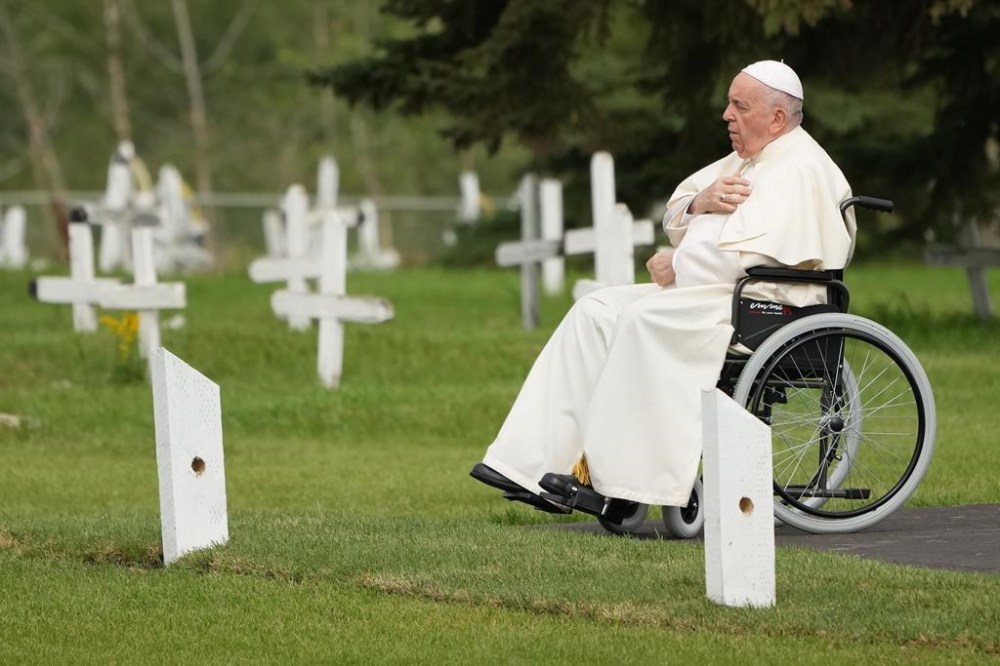Pope is correct: apologies are not enough
Read this article for free:
or
Already have an account? Log in here »
To continue reading, please subscribe:
Monthly Digital Subscription
$0 for the first 4 weeks*
- Enjoy unlimited reading on winnipegfreepress.com
- Read the E-Edition, our digital replica newspaper
- Access News Break, our award-winning app
- Play interactive puzzles
*No charge for 4 weeks then price increases to the regular rate of $19.00 plus GST every four weeks. Offer available to new and qualified returning subscribers only. Cancel any time.
Monthly Digital Subscription
$4.75/week*
- Enjoy unlimited reading on winnipegfreepress.com
- Read the E-Edition, our digital replica newspaper
- Access News Break, our award-winning app
- Play interactive puzzles
*Billed as $19 plus GST every four weeks. Cancel any time.
To continue reading, please subscribe:
Add Free Press access to your Brandon Sun subscription for only an additional
$1 for the first 4 weeks*
*Your next subscription payment will increase by $1.00 and you will be charged $16.99 plus GST for four weeks. After four weeks, your payment will increase to $23.99 plus GST every four weeks.
Read unlimited articles for free today:
or
Already have an account? Log in here »
Hey there, time traveller!
This article was published 28/07/2022 (1230 days ago), so information in it may no longer be current.
Indigenous people in Manitoba suffered the highest rates of violent crime victimization in the country in 2020. Manitoba also had the highest rate of children in foster care in 2021, the vast majority of whom were Indigenous.
The statistics, released last week, are not new. Indigenous people in Canada have long been at greater risk of violent crime than non-Indigenous people. At the same time, governments have for decades apprehended Indigenous children into the child-welfare system at disproportionately high rates.
The statistics are a stark reminder that residential schools – which Pope Francis apologized for this week during his “penitential pilgrimage” in Canada – and other failed assimilative policies are not simply historical wrongs from the distant past that Indigenous peoples can easily overcome.
Canada’s colonial policies have caused intergenerational trauma that continues today. In many cases, the colonial policies Pope Francis referred to remain firmly entrenched in Canadian society.
Nowhere is that more evident than in Canada’s child welfare system, where Indigenous children are separated from their families at rates far higher than those experienced by non-Indigenous children.
Canada’s colonial policies have caused intergenerational trauma that continues today. In many cases, the colonial policies Pope Francis referred to remain firmly entrenched in Canadian society.
According to Statistics Canada’s May 2021 census, there were 4,905 children, from infants to age 14, in foster care in Manitoba. That’s about two per cent of the children in that age group – a rate five times higher than the national average. Among the Manitoba children in care, about 90 per cent were Indigenous.
Recent steps have been taken, including under new federal legislation, to transfer the administration of child welfare to Indigenous communities where they belong. However, that transfer will take years to complete. In the meantime, the system remains fraught with colonial mentalities, in which Indigenous children and families are treated differently than non-Indigenous members of the community.
That continues to be a common trait in many aspects of Canadian society, much of which is linked to the country’s colonial past and the failed, ruinous assimilative policies cited by Pope Francis.
Indigenous peoples, for example, continue to suffer the highest rates of violent crime victimization in the country. The national homicide rate for Indigenous victims in 2020 was 10.05 people per 100,000, according to StatCan figures. That’s about seven times as high as the 1.41 per 100,000 rate for non-Indigenous Canadians.
The divide was even greater in Manitoba: 15.32 per 100,000 Indigenous people, compared with 1.26 for non-Indigenous Manitobans.

Pope Francis
Indigenous peoples are also disproportionately represented in Canadian prisons and receive harsher treatment behind bars than non-Indigenous inmates. Several reports issued by Canada’s Correctional Investigator, Ivan Zinger, have shown Indigenous inmates are more likely to end up in solitary confinement, are disproportionately classified as high risk and placed in maximum security, and are subjected to more physical force than non-Indigenous inmates.
There are many other examples of how Canada’s colonial policies have led to poor outcomes in health, education and employment for Indigenous peoples – not to mention the deplorable living conditions many Indigenous communities are forced to endure.
Pope Francis said this week that apologies are not enough to reverse the intergenerational harms residential schools and other assimilative policies have caused. He is right. Much more needs to be done, including by the Catholic church, to not only right the wrongs of the past, but to fundamentally change the inequities that exist today between Indigenous and non-Indigenous people.











